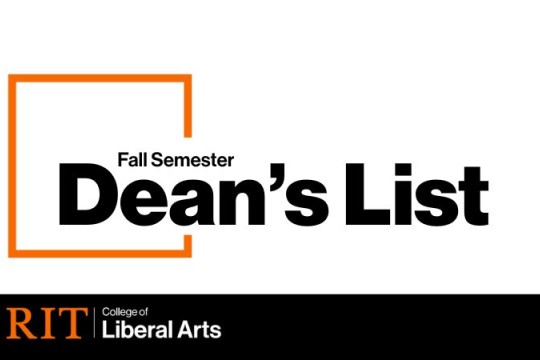Department of Sociology and Anthropology

Department of
Sociology and Anthropology
- RIT/
- College of Liberal Arts/
- Academics/
- Academic Departments/
- Department of Sociology and Anthropology
The Department of Sociology and Anthropology supports an interdisciplinary approach to the study of global, urban, historical, and cultural experience, practices, and change.
Our faculty are scholarly experts in archaeology, cultural anthropology, economics, education, folklore, psychology, and sociology which represent academic disciplines dedicated to the understanding of human social life, past and present. We share a commitment to global justice, human rights, and sustainable futures. As faculty in historically related social science disciplines, our research and teaching crosscut important themes and social issues related to gender, class, race and ethnicity, exploitation, domination, and the multiple embodiments of power.
Undergraduate Programs
Our programs emphasize the understanding and critique of social inequalities that exist around the world. You will explore the interconnectedness of human societies and their environments, the dynamics of human diversity, and how cultural practices are mediated on the global and local levels from prehistory to the present. Our hands-on programs include opportunities for ethnographic research, personal interviews, archaeological survey and excavation, laboratory characterization, archival research, media analysis, and quantitative data analysis. A unique area of specialization allows you to deepen your understanding of topics and themes that matter to you.
RIT’s international and global studies BS degree transforms students into global experts who can assess and analyze the salient issues of worldwide transformation.
Learn more about the International and Global Studies BS programRIT’s bachelor of science in sociology and anthropology focuses on understanding social and cultural complexity and diversity, with a commitment to the broader values of justice and human rights.
Learn more about the Sociology and Anthropology BS programLatest News
-
February 10, 2026

RIT College of Liberal Arts Announces Dean’s List for the Fall 2025 Semester
Three hundred and sixty College of Liberal Arts undergraduate students earned a spot on the fall 2025 semester dean's list, including 74 who are double majors with the college.
-
October 2, 2025

New Global Futures Interdisciplinary Degree Equips Grads with Toolbox for Lifelong Success
Flash forward fifty years, and what will it take for our workforce, our communities, or our societies to thrive? While none of us has a magic crystal ball, the new Global Futures undergraduate degree program developed by the RIT College of Liberal Arts aims to equip grads with the mindset, tools, and skills to anticipate and envision a pathway for future flourishing.
-
September 9, 2025

Winter, Spring, and Summer 2026 RIT Faculty-Led Study Abroad Programs
If you’re considering studying abroad, but aren’t quite sure how it will fit into your schedule, a Faculty-Led Study Abroad Program may be the perfect option. RIT’s College of Liberal Arts faculty are leading a fascinating range of courses during spring and summer 2026.
Featured Work and Profiles
-
Double the Possibilities for this 2025 Grad
Double the Possibilities for this 2025 Grad Meet Adrienne Sanza, a May 2025 grad whose RIT experience included two majors, two minors, and two transformative study abroad experiences.
Read More about Double the Possibilities for this 2025 Grad -
RIT Alumna Takes on Top National Security Challenges
Brianna Alverson addresses national security challenges at the Johns Hopkins Applied Physics Laboratory. Her work on cyber threats and emergency preparedness help secure the nation.
Read More about RIT Alumna Takes on Top National Security Challenges -
Broad Range of Degrees Pave Student's Path to Success
Ebony Eli From engineering to sociology, Ebony Eli's RIT journey shaped her into a program development specialist at a food bank, where she uses her interdisciplinary education to serve underserved communities....
Read More about Broad Range of Degrees Pave Student's Path to Success -
Student Transforms Ambition into Reality with Dual Degrees and a Master’s
Colin Farmer is set to graduate with a double major in journalism and sociology, a minor in advertising, an immersion in cultural anthropology, and a master’s degree in communication—all within four...
Read More about Student Transforms Ambition into Reality with Dual Degrees and a Master’s -
Internship at National Geographic Fulfills Student's Lifelong Interest
Anna Pasquantonio worked as a film and media archives intern at the National Geographic Society.
Read More about Internship at National Geographic Fulfills Student's Lifelong Interest -
Minors and Immersions
The immersion in American Indian and indigenous studies enhances students’ knowledge of the unique heritage of American Indian and indigenous peoples and their relationships with people from other communities and nations. This enhanced understanding is grounded in the study of the histories, collective memories, cultures, and languages of American Indian and indigenous peoples, and the representations, stereotypes, and pertinent laws and policies governing their lives. Immersion courses emphasize indigenous ways of knowing and learning in the past and present in the Americas and across the globe.
Learn more about the American Indian and Indigenous Studies Immersion programThe American Indian and Indigenous studies minor enhances students’ knowledge of the life-worlds of American Indians and Indigenous peoples in the Americas. Building on diverse perspectives and scholarly resources, the course work in the minor will broaden students’ understanding of the political experiences, collective memories, ethnohistories, sociocultural traditions, and the contributions of Indigenous peoples to communities and nations. Courses explore a diverse range of topics, including sovereignty, language revitalization, identity, representation, and activism.
Learn more about the American Indian and Indigenous Studies Minor programThe minor in anthropology and sociology offers disciplinary insights on understanding human social life, both from local and global perspectives. Through anthropology we discover and appreciate the diversity of other cultural systems on a global scale. Through sociology we discover how our own lives are influenced by social relationships around us. Careful selection of courses provides insights into a wide range of topics such as human history and prehistory through archaeology, gender and sexuality, race, ethnicity, social class, inequality, health, urban life and cities, cultural images and mass media, war and violence, social movements, social and cultural change, and globalization.
Learn more about the Anthropology and Sociology Minor programArchaeology is the study of the human past by means of the physical residues of past human behavior: for example, pottery, stone, and metal tools, and the remains of ancient dwelling sites. An archaeologist explains how human society has changed and developed over time using such physical evidence. Archaeology employs techniques from the physical sciences to build a more detailed picture of the human past. Students explore the worlds of the past through hands-on applications of physical science techniques in a diverse range of fields, including chemistry, metallurgy, biology, and material science, applying these disciplines in a novel and challenging context.
Learn more about the Archaeology Immersion programArchaeology is the study of the human past, principally by means of the physical residue of past human behavior. Archaeological science is the application of techniques from the physical sciences to research problems in archaeology and related disciplines. Over the past six decades archaeological science has provided powerful tools for understanding the past, ranging from absolute dating to bone chemistry. It has become an established sub-field within the discipline of archaeology, which itself has grown during the same period from a discipline largely focused on cultural history (the use of artifacts to reconstruct regional cultural sequences) and the validation of documentary history to the explanation of the processes of cultural change in the past.
Learn more about the Archaeology Minor programThe interdisciplinary immersion in Black studies examines the social construction of racial differences and its relation to the perpetuation of racism and racial domination. A key component of this immersion is to investigate the meanings and dimensions of Blackness that reverberate from slavery and colonialism to the persistent political, social, and cultural implications of racialization in the 21st century. The immersion emphasizes how Blackness intersects with other ethnic identities and how it is shaped by gender, sexuality, and economic inequities. The aim is to refine and advance students’ knowledge of Black life-worlds and experiences across the globe.
Learn more about the Black Studies Immersion programExamine the social construction of racial differences and their relation to the perpetuation of racism and racial domination. A key component of this minor is an investigation of the meanings and dimensions of blackness that reverberate from slavery and colonialism to the persistent political, social, and cultural implications in the 21st century. The minor emphasizes how blackness intersects with other ethnic identities and how it is shaped by gender, sexuality, and economic inequities. The aim is to refine and advance students’ knowledge of black life-worlds and experiences across the globe.
Learn more about the Black Studies Minor programCultural anthropology is the study of culture, past and present, from a worldwide comparative perspective. As a disciplinary field, cultural anthropology attempts to provide insights on how human beings across the globe live and work and shape their cultural world in families, cities, societies, ethnic groups, nations, and networked solidarities through ideas, ideologies, beliefs, and values or world views. One of the goals of cultural anthropology is to promote understanding among peoples—an increasingly important venture in our vastly interconnected world communities.
Learn more about the Cultural Anthropology Immersion programThe impact of global change is dramatic and far-reaching, altering the dynamics of everyday life on a planetary scale. The minor in globalization provides students with the opportunity to think creatively about a range of globalizing processes, theories, and practices (in cultural, political, social, biomedical, economic, and artistic contexts). Courses investigate issues pertinent to the phenomenon of globalization, including cultural exchange; multicultural communities; global governance; information transfer; and social, environmental, health, and labor issues. Accelerated by communication technologies, globalization redefines how individuals and communities experience and view the world.
Learn more about the Globalization Minor programThis immersion in health, culture, and society focuses on the shifting configurations of health and culture in a globalizing world. Health beliefs, including notions about bodily integrity or emotional well-being, illness causation, and diagnostic practices, and the experiences, expressions, and treatments of human ailments unfold in concrete cultural contexts. Every society has some form of health care system, which is minimally administered by community members or specialized practitioners. By moving beyond the lens of western biomedicine, the immersion provides students with a set of tools for analyzing the impact of culture on how health care is delivered, how health symptoms are interpreted and communicated by patients and health providers, and how costs for treatment are calculated and managed in relation to perceived benefits. Courses examine the interrelation between health and culture from a number of perspectives and contexts, including the cultural realities within which bodies are meaningfully constituted or in some cases enhanced by technology, the culture-specific communicative or representational health practices, the socially constituted experiences of trauma, death, suffering, and healing, and the various culturally mediated approaches to health care costs and remedies.
Learn more about the Health, Culture, and Society Immersion programAll societies have some cultural ideas and belief systems about health and wellness. Culture shapes our understanding of bodily processes. Because of the significant influence of culture on perceptions and experiences of health and wellness, this minor thematizes the shifting cultural configurations of health in a globalizing world. Culturally grounded health and illness concepts, including notions about bodily integrity or emotional well-being, cultural models of illness causation and diagnostic practices, and the experiences, expressions, and treatments of human ailments unfold in concrete socio-cultural contexts. The courses in this minor provide an enhanced cultural understanding about health experiences in different parts of the world.
Learn more about the Health, Culture, and Society Minor programLanguage is a fundamental property of being human. Linguistics, the study of human language, is one of the four branches of anthropology. Linguistic anthropology explores the dynamic interrelationships among language, culture, and society, how human beings make sense of the world, and participate in social life through creative speech acts and linguistic play. Courses familiarize students with a range of theoretical and analytic approaches, including general linguistics, sociolinguistics, theories of languages, communication, semiotics, and literary studies.
Learn more about the Linguistic Anthropology Immersion programThe immersion in sociology provides insights into the interactions between individuals and the major social forces shaping their lives. Students will learn sociology’s perspectives and methods and use them to explain how society is possible, to examine various social problems, and to assess collective efforts for social change.
Learn more about the Sociology Immersion programIn the 21st century, narratives transcend traditional boundaries and come to life across various platforms. Transmedia storytelling is an innovative approach that has gained significant prominence in the digital age, extending a narrative universe beyond a single medium, allowing the story to exist and evolve through various channels such as film, television, books, graphic novels, video games, social media, augmented reality, and more. This immersion introduces students to the concept of transmedia storytelling and teaches the application of the concept to a range of media, including film, creative writing, screenplays, theater, and more. Students will take ITDL/DHSS-500 first (or synchronously with other immersion courses) and then choose from the remaining optional electives. This immersion will appeal to students from the colleges of Liberal Arts, Art and Design, Computing and Information Sciences (including game design), as well as other colleges. The immersion can be completed either at RIT's main campus, off-site in Los Angeles (as part of the Study Away: LA program), or at one of RIT's global campuses.
Learn more about the Transmedia Storytelling and Entertainment Immersion programIn the 21st century, narratives transcend traditional boundaries and come to life across various platforms. Transmedia storytelling is an innovative approach that has gained significant prominence in the digital age, extending a narrative universe beyond a single medium, allowing the story to exist and evolve through various channels such as film, television, books, graphic novels, video games, social media, augmented reality, and more. This minor builds on the immersion in transmedia storytelling and entertainment and allows students to apply the concept of transmedia storytelling to a range of media in two additional courses, including film, creative writing, screenplays, museums, theater, and more. This minor will appeal to students from the colleges of Art and Design, Computing and Information Sciences (including game design), as well as other colleges. The minor can be completed either at RIT's main campus, off-site in Los Angeles, or at select global campuses.
Learn more about the Transmedia Storytelling and Entertainment Minor programMetropolitan areas must address such enduring issues as poverty, homelessness, affordable housing, transportation, pollution, education, water and food security, health, crime, safety, recreation, zoning, segregation, ethno-racial tensions, and economic development. Each city must do so with recognition of its place in the wider regional, national, and global contexts. The urban studies immersion helps students identify and analyze such fundamental issues and allows them to explore and assess various ways policy-makers respond to those issues.
Learn more about the Urban Studies Immersion programStudent Resources
Here you will find additional resources for the Department of Sociology and Anthropology, such as double majors, 4+1 programs, co-op resources, and international and global studies resources.
See Resources for the Department of Sociology and Anthropology
In 2023, the department congratulated its graduates with a celebratory video.












